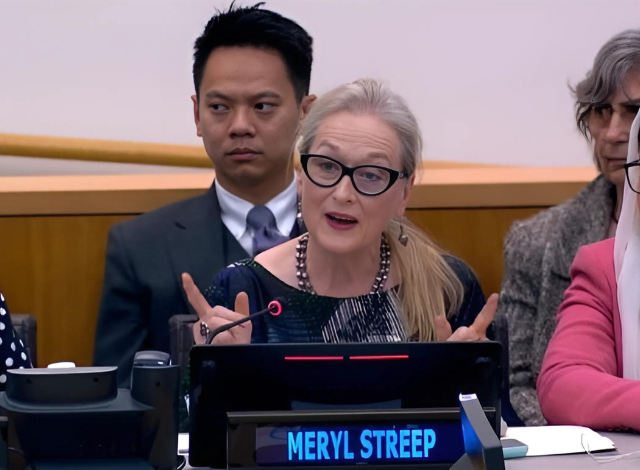Meryl Streep’s UN speech sparks global action against Taliban’s treatment of women

Meryl Streep, the acclaimed actress, used her platform at the sidelines of the United Nations General Assembly to draw attention to the severe restrictions placed on women and girls in Afghanistan under Taliban rule.
In a striking comparison, she said that animals like cats, squirrels, and birds in Afghanistan have more rights than women.
“A cat may feel the sun, a bird may sing, but a girl in Kabul may not,” Meryl Streep pointed out, labeling the treatment of women by the Taliban as an unnatural and “odd” suppression of basic freedoms.
Her remarks quickly gained traction on social media, leading to a strong international response.
Following Streep’s speech, four countries, Germany, Australia, Canada, and the Netherlands, announced “unprecedented” legal action against the Taliban for their systematic oppression of women and girls.
They accused the Taliban of violating the Convention on the Elimination of All Forms of Discrimination against Women (CEDAW), a treaty Afghanistan had ratified under the previous government in 2003.
Australian Foreign Minister Penny Wong stated that the women of Afghanistan are being “erased” from public life due to the Taliban’s oppressive policies.
Since the Taliban regained control of Afghanistan three years ago, they have progressively tightened restrictions on women and girls.
Females are now prohibited from working or attending school beyond grade 6, and strict rules about covering their bodies and limiting interaction with men are in place.
The Taliban’s latest decree requires women to remain silent in public, as their voices are considered too intimate to be heard.
This suppression has contributed to a mental health crisis in the country, with a sharp rise in depression and suicide rates among Afghan women.
Human Rights Watch has indicated that the joint action taken by the four countries could lead to formal legal proceedings at the International Court of Justice in The Hague.
Afghanistan, as a signatory of CEDAW, is expected to respond to the complaint, but the Taliban, who did not sign the treaty, has so far shown no sign of changing its stance.
The Taliban’s spokesman dismissed the accusations, calling them “absurd” and claimed that human rights in Afghanistan are fully protected.
In an interview, Meryl Streep said she felt compelled to speak up for Afghan women, likening the Taliban’s policies to the “erasure of an entire gender.”
Fawzia Koofi, a former Afghan MP, echoed Streep’s sentiments, highlighting that Afghanistan has changed and that women continue to resist despite the Taliban’s efforts.
Afghan women, some of whom have defied the Taliban’s ban on public speech by posting videos of themselves singing, are showing that their voices will not be silenced.
This defiance, Koofi remarked, is a testament to the resilience of Afghan women and their determination to reclaim their place in society.
Human rights advocates, including Fereshta Abbasi of Human Rights Watch, believe the international action could be a critical step toward justice for Afghan women.
Fereshta Abbasi urged other countries to support this move and ensure that Afghan women are actively involved as the legal process unfolds.
Despite the challenging situation, there is hope that these efforts will hold the Taliban accountable for their violations of human rights.





